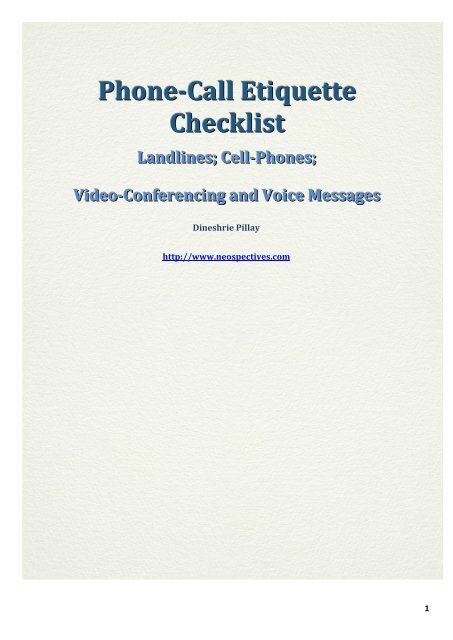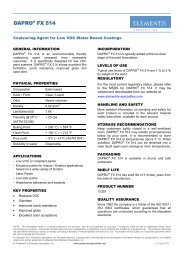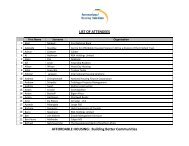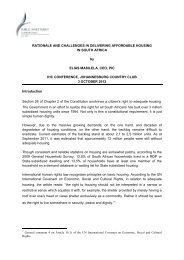Phone-Call Etiquette Checklist Landlines; Cell-Phones - Plusto.com
Phone-Call Etiquette Checklist Landlines; Cell-Phones - Plusto.com
Phone-Call Etiquette Checklist Landlines; Cell-Phones - Plusto.com
Create successful ePaper yourself
Turn your PDF publications into a flip-book with our unique Google optimized e-Paper software.
<strong>Phone</strong>-<strong>Call</strong> <strong>Etiquette</strong><br />
<strong>Checklist</strong><br />
<strong>Landlines</strong>; <strong>Cell</strong>-<strong>Phone</strong>s;<br />
Video-Conferencing and Voice Messages<br />
Dineshrie Pillay<br />
http://www.neospectives.<strong>com</strong><br />
1
A. BUSINESS ETIQUETTE: MAKING PHONE CALLS<br />
No Summary Detail Check<br />
1 Decide on the mode of<br />
<strong>com</strong>munication<br />
2 Write down notes on<br />
what you want to<br />
discuss<br />
3 Leaving messages with<br />
a PA or 3 rd party<br />
4 Being diverted from<br />
one person to the next<br />
1. Consider whether or not a telephone call is the best mode of <strong>com</strong>munication<br />
for the content of your discussion.<br />
2. For more <strong>com</strong>plex, lengthier discussions, an in-person meeting might be more<br />
suitable.<br />
3. For quick business updates, consider using e-mail instead of telephone<br />
appointments.<br />
1. When you engage in a phone-call, the initial discussion is more likely going to<br />
be about pleasantries.<br />
2. To avoid you forgetting what your phone-call is about, once the pleasantries<br />
are over, write some notes that you want to talk to before making the phonecall.<br />
3. Review your bullets of information so that you are certain to cover all<br />
important points.<br />
1. Never leave your phone number with the person who does not know who<br />
you are and has no idea why you called.<br />
2. Don’t be offended if the secretary asks “Will he or she know what this is<br />
regarding?’ It is their role to filter calls.<br />
3. Never get irritated with an assistant, because the manager is unable to take<br />
your call. Your bad review will be passed on.<br />
4. If your calls are not taken, ask when is the best time to return calls. Don’t<br />
whine about it – this is not professional!<br />
1. Even though you might have introduced yourself to the receptionist,<br />
reintroduce yourself to the person you are calling so that there are no<br />
mix-ups.<br />
5 <strong>Phone</strong> disconnects<br />
during the call<br />
6 Taking phone-calls that<br />
you are not prepared<br />
for<br />
1. If you call someone and are disconnected, you are responsible for redialing,<br />
even if they are responsible for accidentally hanging up.<br />
2. Since you placed the call, you know how to reach them!<br />
1. When you mistakenly take a phone-call that you are not prepared for, spend<br />
a few minutes on the phone as a matter of courtesy.<br />
2. Then reschedule the appointment for a later date.<br />
3. You will lose credibility when you are not prepared and try to respond<br />
on-the-cuff.<br />
7 Smile when speaking 1. Even without a video image, smiling is seen and experienced over the phone.<br />
2. It also affects the quality of your voice - sounding bright, friendly and<br />
enthusiastic.<br />
8 Ending the<br />
conversation<br />
1. Before ending the conversation, summarize the call to make sure each of you<br />
have the same understanding, and determine the next action steps.<br />
2. Even if you are in a rush, say goodbye, but wait for it to be reciprocated.<br />
Otherwise it might feel like you have hung up on the person!<br />
9 Returning calls 1. Return all calls the same day.<br />
2. If it is late in the evening to return the phone-call, consider sending an SMS or<br />
email, saying that you will follow-up the next day.<br />
2
B. BUSINESS ETIQUETTE: CELL-PHONE CONVERSATIONS<br />
No Detail Check<br />
1 Consider whether or not it is an appropriate time to make a call.<br />
2 Consider where you are and who might overhear the content of your conversation.<br />
3 Excuse yourself and make the call in private if the timing is appropriate.<br />
4 Speak clearly. If you have a bad connection and are breaking, up tell the person you will call him or her<br />
back.<br />
5 Keep cell phones turned off or set to ‘silent’ in meetings.<br />
6 Keep personal calls to a minimum, especially if you are using a cell phone that is paid for by the<br />
<strong>com</strong>pany.<br />
7 When in the <strong>com</strong>pany of others, ask permission to take the call.<br />
8 Do not transact important business matters on the phone if you are in the presence of others who are<br />
not part of that transaction.<br />
C. BUSINESS ETIQUETTE: VIDEO & TELEPHONE CONFERENCING<br />
No Detail Check<br />
1 Confidential calls should be made in privacy and not be broadcasted.<br />
2 Appoint one person to initiate the call.<br />
When everyone is present, make introductions so that everyone is acknowledged.<br />
3 It is not easy to recognise and remember voices, so identify yourself when you join a conversation and<br />
when you leave the conversation.<br />
4 Speak clearly and project your voice. It is considerate to ask if the receiver can hear you well enough.<br />
5 If you begin a conversation on the telephone and then include others on the call, ask permission from<br />
the receiver before putting them on loudspeaker.<br />
6 Get to the venue early to test the video or tele-conferencing technology.<br />
7 A video or tele-conferencing is still a formal version of a meeting.<br />
Ensure that you follow the rules for a meeting. This means having an agenda, sending out pre-reading<br />
material and getting to the meeting prepared and on time.<br />
3
D. BUSINESS ETIQUETTE: YOUR PERSONAL VOICE MAIL MESSAGE<br />
No Summary Detail Check<br />
1 Outgoing message 1. Your outgoing message should be given in a friendly voice, stating your<br />
name and requesting that the caller leave a message and phone number.<br />
2. Keep it brief and to the point.<br />
3. <strong>Call</strong>ers don’t want to spend time listening to where you may be or how<br />
sorry you are that you missed the call.<br />
2 Avoid being flippant or<br />
cute on your voice-mail<br />
3 Re-fresh your<br />
voice-mail message<br />
4 On-leave or out-of-the<br />
office messages<br />
5 Check your voice-mail<br />
messages regularly<br />
1. While talking like Daffy Duck or Barry White may be funny at home, it<br />
does not convey a professional business image.<br />
2. Humorous messages may seem charming at first, even perhaps the<br />
second time and then it gets irritating.<br />
1. Change your voice-mail message every three months.<br />
2. Occasionally, call your own number, to evaluate how a new customer,<br />
colleague, or vendor might perceive you.<br />
1. Leave a voice message when on leave.<br />
2. The voice message needs to be simple, stating the dates when you will be<br />
unavailable.<br />
3. Include within your message an alternative contact number and or<br />
person, should the message be urgent.<br />
4. Nobody needs to know where you are and what a fantastic time you are<br />
having!<br />
1. Check your voice mail at least twice a day, and more than twice a day, if<br />
you receive sensitive information.<br />
4
E. BUSINESS ETIQUETTE: LEAVING VOICE MAIL MESSAGES<br />
No Summary Detail Check<br />
1 Identify yourself 1. Always identify yourself by leaving your name and <strong>com</strong>pany contact<br />
details.<br />
2. Don’t assume that your voice will automatically be recognised.<br />
2 Have your bullet points<br />
on hand<br />
3 Content of voice-mail<br />
messages<br />
1. Keep notes by the phone to jot down your main points prior to making a<br />
phone call.<br />
2. If you reach your caller in person, you will be able to remember all your<br />
important issues.<br />
3. If you are required to leave a voice-mail, you will be equally prepared.<br />
1. Keep voice-mails friendly, short, and clear with an indication of next steps<br />
or action required.<br />
2. If the voice-mail is lengthy, leave your phone number clearly and<br />
distinctly at the beginning and at the end of the message.<br />
3. Never leave a harsh or negative voice-mail. It can be listened to over and<br />
over, forwarded, archived and put on a speakerphone to share with the<br />
office.<br />
4 Quantity of messages 1. Consider the number and length of the messages that you leave for that<br />
person, in relation to the number of messages that the recipient may<br />
receive in a day.<br />
2. Leaving 1 voice-mail message is sufficient.<br />
5 Sharing confidential<br />
information<br />
1. Due to the non-secured aspect of voice mail, confidential information is<br />
best shared in person.<br />
6 Background noise 1. Don’t leave voice-mails where background noise from loud restaurants,<br />
jammed bars, parties or boisterous family gatherings can be heard.<br />
7 Returning voice-mail<br />
messages<br />
1. Return all voice mail the same day, even if you end up leaving a voice mail<br />
yourself.<br />
5












